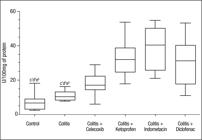Context
Nonsteroidal anti-inflammatory drugs are considered one of the most important causes of reactivation of inflammatory bowel disease. With regard to selective cyclo-oxygenase 2 inhibitors, the results are controversial in experimental colitis as well as in human studies.
Objectives
The aim this study is to compare nonsteroidal anti-inflammatory drugs effects, selective and non selective cyclo-oxygenase 2 inhibitors, in experimental colitis and contribute to the understanding of the mechanisms which nonsteroidal anti-inflammatory drugs provoke colitis exacerbation.
Methods
Six groups of rats: without colitis, with colitis, and colitis treated with celecoxib, ketoprofen, indometacin or diclofenac. Survival rates, hemoglobin, plasmatic albumin, colonic tissue of interleukin-1ß, interleukin-6, tumor necrosis factor alpha, prostaglandin E2, catalase, superoxide dismutase, thiobarbituric acid-reactive substances, chemiluminescence induced by tert-butil hydroperoxides, and tissue and plasmatic leukotriene B4 were determined.
Results
The groups treated with diclofenac or indometacin presented lower survival rates, hemoglobin and albumin, higher tissue and plasmatic leukotriene B4 and tissue superoxide dismutase than the group treated with celecoxib. Ketoprofen presented an intermediary behavior between diclofenac/indometacin and celecoxib, concerning to survival rate and albumin. The groups without colitis, with colitis and with colitis treated with celecoxib showed leukotriene B4 and superoxide dismutase lower levels than the groups treated with nonselective cyclo-oxygenase 2 inhibitors.
Conclusions
Diclofenac and indometacin presented the highest degree of induced colitis exacerbation with nonsteroidal anti-inflammatory drugs, celecoxib did not show colitis exacerbation, and ketoprofen presented an intermediary behavior between diclofenac/indometacin and celecoxib. These results suggest that leukotriene B4 and superoxide dismutase can be involved in the exacerbation of experimental colitis by nonselective nonsteroidal anti-inflammatory drugs.
Colitis; Non-steroidal anti-inflammatory agents; Eicosanoids; Oxidative stress

 Thumbnail
Thumbnail
 Thumbnail
Thumbnail
 Thumbnail
Thumbnail
 Thumbnail
Thumbnail



